Managing Hot Flashes Naturally with Maryon Stewart

This article was contributed by Maryon Stewart BEM, widely recognized as a pioneer of the "Natural Menopause Movement." Maryon empowers women to navigate menopause naturally, offering strategies to manage symptoms as an alternative to hormone replacement therapy.
Heat waves are bad enough when we can control our thermostat. Add hot flashes and night sweats to the mix and it can become impossible to function. It is estimated that over 80 percent of women experience hot flashes at some point in their lives, which can occur even before our periods end, and persist for several years after menopause. While the exact cause of hot flashes is still unknown, experts believe that the decrease in estrogen levels may impact the hypothalamus, the part of the brain responsible for regulating body temperature.
Hot flashes frequency, duration, and intensity vary significantly from person to person. Some individuals may experience several hot flashes throughout the day, while others may suffer from continuous episodes that disrupt both day and night. These episodes typically last from a few seconds to several minutes. In addition to the sudden sensation of heat, individuals may also experience a racing heart, dizziness, anxiety, and irritability.
Night sweats, which are severe versions of hot flashes during the night, can be particularly distressing. They can cause individuals to wake up drenched in perspiration, often necessitating a change of pyjamas and bed sheets. The lack of sleep due to night sweats can lead to chronic exhaustion. Furthermore, many women avoid physical contact with their partners, as it can trigger a hot flash, resulting in feelings of rejection and relationship problems.
To alleviate the discomfort caused by hot flashes and night sweats, try these strategies:
- Embrace and acknowledge your hot flash experiences without feeling embarrassed. When you feel a hot flash coming on, pause your activities and take slow, deep breaths to promote relaxation, which may help reduce the severity of the episode.
- Drink a glass of cold water and sit calmly until the hot flash subsides.
- Consume small, frequent meals instead of large ones, as the heat generated during digestion can trigger hot flashes.
- Include plenty of phytoestrogens in your diet, including soy and flaxseeds as they fool the brain into believing we have normal circulating estrogen, helping to alleviate symptoms.
- Wear sleepwear designed to minimize night sweats or layered clothing that can be easily removed when you feel overheated. Opt for natural fiber fabrics like cotton to allow your skin to breathe.
- Keep your bedroom cool at night and have a fan, wet wipes, and a cold beverage readily available by your bedside.
- Maintain a regular exercise routine, as being physically fit can reduce the frequency and intensity of hot flashes.
- Do a formal session of relaxation each day, like a guided meditation for at least 20 minutes as it’s been shown to help reduce hot flashes by more than fifty percent.
- Refrain from smoking, as research indicates that smoking increases the risk of overheating.
You don’t need to suffer from hot flashes or night sweats. The answers to eradicating hot flashes do not happen overnight but with work will reduce and stop eventually. It takes some perseverance but it will be worth it in the end – keep the end goal in sight. And, in the meantime, keep wearing the stylish Become Anti-Flush™ clothing!
Check out how to overcome hot flashes naturally in episode two of Maryon Stewart’s Menopause Solutions TV series on PBS.
To find out more about Maryon Stewart’s successful Natural Hormone Rebalancing Protocol join her free Femmar Community.
More Posts
-
Become Wins an Opra...
We’re beyond thrilled to share that Become has been honored with an Oprah Daily Menopause O-ward ! This recognition highlights our commitment to pr...
Read More -
Tips for a Calmer, ...
The festive season is a time for joy and connection, but it can also disrupt routines and feel overwhelming, particularly during (peri)menopause. ...
Read More -
Managing Hot Flashe...
This article was contributed by Maryon Stewart BEM, widely recognized as a pioneer of the "Natural Menopause Movement." Maryon empowers women to na...
Read More







Comments
0 Comments
Leave a Comment